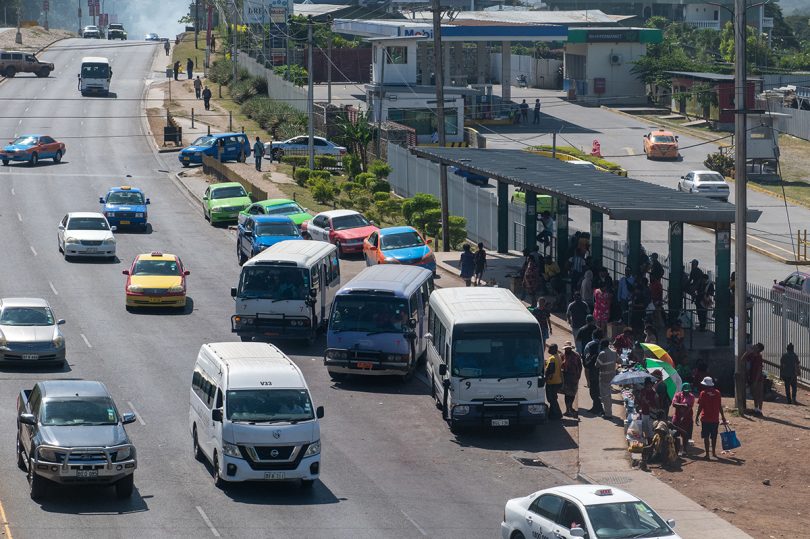Not being apprehensive about your safety in public spaces is a luxury – one that I recently enjoyed as an ANU-UPNG Summer Scholar in Canberra. Sadly, this is not a luxury that is available for Papua New Guineans. The issue of law and order has been a longstanding one in the country, generating concerns of safety among the country’s population, especially its female population. As a female student living in Port Moresby, my safety while travelling to and from school is a cause of concern for myself and my family. The concerns faced by the female population range from petty crimes such as pickpocketing to armed robbery, kidnapping and rape.
During my childhood, I was fortunate to have been spared from the burdens of the anxiety of personal safety while travelling to and from school. My father being an officer with the Papua New Guinea Defence Force (PNGDF) meant that I grew up in the safety net of a military barracks in Port Moresby, and attended the primary school located within the barracks. My daily commute to and from school involved a 15-minute walk through the barracks with my siblings and other children of PNGDF officers.
The only concerns to our safety were speeding cars, and the occasional snake during periods of rainy weather when the bush became overgrown around the path. This cocooned safe reality was not the case for students commuting to school outside the barracks, who had to face the threats of pickpocketing, armed robbery, and drunk and disorderly behaviour from men and youths – all of which I was soon to discover.
High school brought with it the introduction of apprehension for my safety. The high school to which I was selected for my lower secondary education was notorious for the fights among its male student body, and interschool fights with neighbouring secondary schools. It was also located within the vicinity of a suburb that was deemed an unsafe place in Port Moresby.
During the two years I attended the secondary school, there were school fights, petty thefts, drunk and disorderly behaviour from youths due to substance abuse, several armed robberies of students while they were travelling to or from school within the vicinity of the suburb, and the most unfortunate case of the rape of a female student in the toilets located on the outskirts of the school in 2016. Even though I was only a witness to such incidents and not subjected to them myself, the fear was ever present in me and my female fellow students. It prompted us to walk with our guard up at all times, to have our bags and bilums draped in front of us, to pack our phones and purses in the deepest parts of our bags or bilums, and to always be looking over our shoulder when someone got too close in the crowd.
University was no different. Residing off campus required that I still had to travel to and from university, however, unlike high school where classes concluded between 3.30pm and 4pm, I now had some classes that finished at 5pm. On the days when I had late classes, I was most anxious as it was not safe, and especially not safe to be a female travelling alone, so late in the day.
I particularly disliked and avoided the crowded main bus stops, filled with street vendors and people who just loitered about, as it was usually amongst these loitering crowds that opportunist thugs mingled in wait for their next victim to pickpocket or rob. I recall an armed robbery of two passengers on a public bus I was in. It was around 7am, the bus was parked waiting for passengers at the main bus stop at Holola, Port Moresby. I was sitting two rows ahead of a couple of teenagers when two thugs walked in casually and held the duo at knife point. They took their phones and walked out as casually as they walked in, mixing with the crowd outside. I was left shaken and disgusted at the ease with which they committed the theft. However sad and unfortunate the incident was, it is a norm for residents in the city.
These are my trepidations of travelling to and from school, but they are common trepidations shared by women and girls in Port Moresby going about their daily activities. Crime and law and order issues are still on the rise in Port Moresby, in part fuelled by unemployment and the rural to urban drift. There also appears to be a gun and knife culture on the rise among criminals in the city, evident in the increased use of these weapons amongst criminals recently.
While the government is making law and order a priority issue, and the Papua New Guinea Royal Constabulary is working within its capacity to curb crime, this is not a fight to be fought by the government and police alone. Normal citizens must rise and make it their civil duty to take ownership of making their communities safer, working in collaboration with the authorities to make PNG a safe country for all.
Disclosure
This writing of this blog was undertaken with the support of the ANU-UPNG Partnership, an initiative of the PNG-Australia Partnership, funded by the Department of Foreign Affairs and Trade. The views are those of the author only.



Sharon, as a privileged white meri living and working in POM, I know only too well the sense of trepidation and heightened awareness that females in PNG live with. What saddens me most is that no-one should have to live with that ever-present sense of wariness when just going about their daily life.
It’s so evident uncontrolled migration fueled by unemployment and uncontrolled drift from rural communities to urban towns and cities is no 1 priority for png govt to seriously take on to counter with appropriate interventions. Failing to do so leaves PNG a potential failed state!